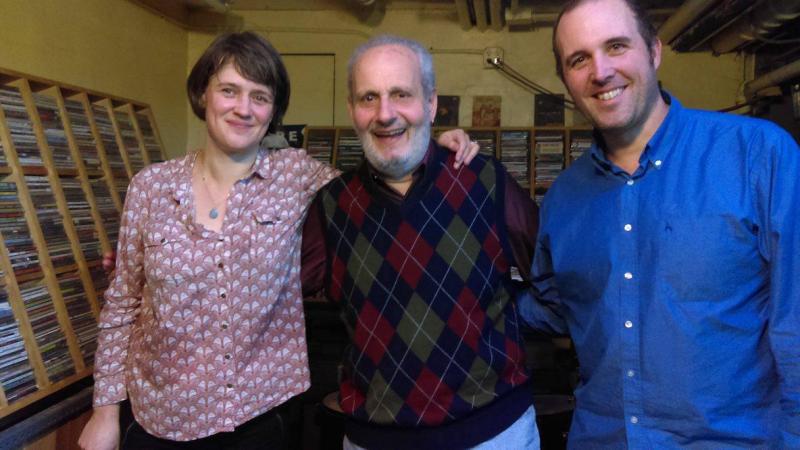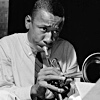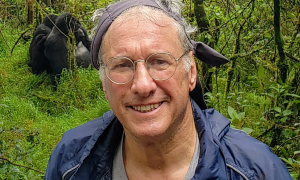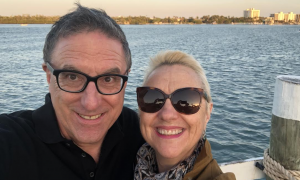Home » Jazz Articles » Out and About: The Super Fans » Meet Richard Berger
Meet Richard Berger

In today's world, with what's going on politically and socially, I need the music more than ever to keep me steady, to keep me focused, and to keep me, really, alive.
Tell us a little about yourself.
I'm a native New Yorker. I grew up in a tenement on Delancey and Clinton Streets, not far from where Sonny Rollins used to go up on the Williamsburg Bridge to play. Then when I was a teenager we moved into a project on Pitt St.
I worked in the record business, both retail and wholesale, for maybe five years. I worked at Record Shack, Colony Records, Record People, J&R, and finally Tape King.
But my main job was working for the Post Office for the better part of 30 years. When you're a mailman you're out there in the streets, you're meeting people; you're like a good will ambassador. It was an interesting career. I was in all different neighborhoods. I'd find different record stores, and I used to go in and see what was going on. That's how I found out about the Jazz Gallery: I was driving my truck one day up Hudson Street and I saw this sign for the Jazz Gallery and I went up upstairs. It was when it was just opening, before they had concerts there. I met [founder] Dale Fitzgerald, and my wife, Roberta, and I became members.
What is your earliest memory of music?
The first thing I can remember is hearing this novelty song, "Open the Door, Richard!" My mother and father always had the radio on. They listened to WNEW: Martin Block, Make Believe Ballroom, the great American songbook, Ella Fitzgerald, Billie Holiday, Frank Sinatra, all the big bands.
And then at the same time, my brother, who was older than I was, was an amateur horn player. He played alto, and he was a huge Charlie Parker fan, as I guess all alto players were. We shared a room, and he always used to play Bird's records, especially his solos, over and over. He'd say, "Listen to this, listen to this!" But I couldn't really hear it the way he did. I didn't get jazz until later on.
Then in the early '60s, when I was a young teenager, Ed Sullivan had all the groups on, and when I heard the Beatles, it was like the sky opened up for me, and I just kind of joined that whole magical mystery tour that they went on.
Following that path, I also got heavily involved with drugs and alcohol, so music was partnered with that for a long time. The reason I bring that up is because I was able to free myself from it, with a lot of help, and since that point, the music has become a kind of positive addiction for me. I threw myself into it even more because I needed to fill the hole inside me that I'd been filling up with drugs and alcohol. And it remains that way for me today. Music keeps me going. And in today's world, with what's going on politically and socially, I need the music more than ever to keep me steady, to keep me focused, and to keep me, really, alive.
What is it about music that does that for you?
I don't have strong religious beliefs. I consider myself more of a spiritual person, and music is kind of my path into spirituality. God, the spirit, the force that I believe created everything and keeps everything going—I feel like music is the universal language that connects me to that force.
What was the first concert you remember?
The Newport Folk Festival. I saw Buffy Sainte-Marie and was mesmerized. I realized at that moment that music could convey more than just the music. She was talking about women, Indians, and political stuff, and I had not heard that before.
Was there one album or experience that was your doorway to jazz? In the '70s I got my first job, at the Record Shack, and that's when I really got my education in jazz. I was reintroduced to all the music my brother had tried to introduce me to and, this time, I was able to hear it better. I listened to John Coltrane, Dexter Gordon, Thelonious Monk, Charles Mingus, Duke Ellington. I think Dexter Gordon's Swiss Nights was my intro. His technique really got to my heart.
How long have you been going out to hear live music?
40 years.
How often do you go out to hear live music?
Over those 40 years I'd say my wife, Roberta, and I have gone out on average at least four to five times a week. Back in the '70s, when I was in the record business, it was a different world. There was a lot of money with the labels, and there were shows we could go out to almost every night. I took advantage of that. And I've just continued that all these years.
What is it about live music that makes it so special for you?
Live music is real, it's spontaneous. It's happening right there in the moment, for good or bad. I'm basically the kind of person who looks at life more on the dark side than the light side, who'd say the glass is half empty. And I struggle with mood swings and some depression. Going out to live music for the most part helps me to get out of that darkness. Not all the time, but for the most it part it helps me rediscover the light.
What are the elements of an amazing concert?
It can vary. I can be at a show where I don't know who I'm hearing, and all of a sudden I hear something I haven't heard before, and it's so exciting: Wow, I've never heard this person, and I feel connected to what they're saying to me. And the other side is going to hear people that I love and respect and admire, and it's always nice to hear them and reestablish my connection to them and their music.
To be there, in a club, in a room with other people, not knowing what's going to happen. Someone might play "In the Still of the Night," and you kind of know what they're going to do and they go through changes, and then there's the improvisation section. Or there is total improvisation, a song that someone just makes up in the moment—to me, that's extremely exciting.
Is there one concert that got away that you still regret having missed?
When I was a heavy drug user, I went to see Bruce Springsteen at the Bottom Line and I got so out of it that I had to leave. It's one of my war stories.
If you could go back in time and hear one of the jazz legends perform live, who would it be?
Charlie Parker doing "Loverman." This is very complicated for me because my brother, who was such a Bird person, is gone now, so I miss him. And after my coming around to the music, I really got into Bird and I understood what my brother felt when he heard him. "Loverman" was one of those special, incredible records that he made. Whenever I hear that I think about my brother. And there's an added connection here with my trouble with alcohol and drugs: My brother was killed by a drunk driver, so that resonates even more for me. When I hear Bird, I think about my brother, and I think about him getting killed. So it's complicated for me when I hear that song [but] that's what I want: I want to go back into a club and hear him play that.
What is it about your favorite clubs that makes them your favorites?
I hate rustling and talking during the show. I need real quiet so I can focus. So it has to be a listening room and has to have a really good sound system. The Village Vanguard is the perfect club. The darkness, the mood, the music. Intimacy. You go down those stairs and enter another world where you have left everything else behind you upstairs.
Which club are you most regularly to be found at?
My wife and I have a group of places that we go to on a regular basis. Roulette, the Jazz Gallery, of course The Stone. We go to Jazz at Lincoln Center, including Dizzy's Club Coca-Cola. One of our cornerstones is Arts for Art, which is really like an anchor for us. I'm most connected to them: the concerts they put on [in different venues], the events they're involved with, their whole stand in the world for peace, brotherhood, equality, and the spontaneity of the music. I really feel very connected to the spiritual approach they have.
Is there a club that's no longer here that you miss the most?
Tonic. They had people I wanted to hear because I knew about them, and people I didn't know that I wanted to find out about.
Tell us more about your relationship with Arts for Art.
We had known about the avant- garde scene and were starting to get into it but we really weren't into it, heavy. Then my friend, [publicist] Jimmy Eigo, connected us to Patricia Nicholson Parker and William Parker, and the Vision Festival, and we started going to some of the shows. It really clicked. We felt the community, we felt the love. I just threw myself into it, and I started doing whatever they needed. Come early and help put up chairs, put out flyers, help at the door, make coffee, tea...whatever's needed. It's like a family when we're all together, like we're with our people. And that means a lot to us, especially in New York, because you can get lost here.
Do you have a favorite jazz memory?
My wife and I had a friendship with an American artist, Herbert Gentry, who'd spent some time over in Europe, and knew Dexter Gordon. When Dexter Gordon came back to America, he came into the J&R, where I was working, and I met him. We went down to see him at the Vanguard, and it was an incredible show. He was one of my favorite players and people. Herbert was there, and they got into this thing where they spoke in a certain dialect, and they really connected with each other. It was very special for us to witness that, to see them seeing each other after many years, and just being in a place like the Vanguard, one of the hallowed halls of jazz, and hearing Dexter Gordon live.
How do you discover new artists?
Sometimes I go to see one person and he will have a kickass drummer and I will check them out on their gigs. Also radio, YouTube, Spotify and Pandora. Like, we heard Charles Lloyd live and then we came home and listened to him on Spotify and it blew us away.
Vinyl, CDs, MP3s, or streaming?
I was just looking at our turntable. I want to hook it up again so we can listen to albums. We have somewhat of a collection. I miss the sound the LP, of the crackle and the snaps and the pops. We still have cassettes and we have a cassette player, but most of the time we listen to CDs. And I'm still a very big radio person. I love the radio, I grew up with it. I still have memories of going to bed and putting a radio under my pillow and leaving it on all night with different things on. It was comforting and soothing for me.
If you were a professional musician, which instrument would you play?
I still have my brother's alto. I went down to the Greenwich House Music School and I took some lessons there, but I didn't make the connection with the horn. And you've really got to spend time practicing, practicing, practicing. So I really admire and respect musicians for what they go through to get to where they are. I just didn't have that in me. But if I could play, I'd play the horn.
Life without music would be...
Devastating. I don't know. Of course my relationship with Roberta is my lifeline, she's my blood. And the friends I have are very important to me. But if I didn't have music I don't know if I could remain here. Because sometimes the world gets to me and there are times I don't want to be here. But if I have the music, then I can stay.
Calling all jazz super fans! Do you drive your non-jazz-loving friends crazy with your encyclopedic knowledge of jazz history? Is jazz a big part of what makes life worth living? Do you have an extensive collection of recordings, save ticket stubs, go out to hear live jazz a lot, remember the first concert you ever attended? If any or all of those sound like you, you might be a Jazz Super Fan—and we'd like to consider you for an upcoming column. Contact us for consideration.
Tags
richard berger
Out and About: The Super Fans
Tessa Souter and Andrea Wolper
Sonny Rollins
Jazz Gallery
Ella Fitzgerald
Billie Holiday
frank sinatra
Charlie Parker
John Coltrane
Dexter Gordon
Thelonious Monk
Charles Mingus
Duke Ellington
Bruce Springsteen
Bottom Line
Village Vanguard
Roulette
the Stone
Jazz at Lincoln Center
Dizzy's Club Coca-Cola
William Parker
charles lloyd
PREVIOUS / NEXT
Support All About Jazz
 All About Jazz has been a pillar of jazz since 1995, championing it as an art form and, more importantly, supporting the musicians who make it. Our enduring commitment has made "AAJ" one of the most culturally important websites of its kind, read by hundreds of thousands of fans, musicians and industry figures every month.
All About Jazz has been a pillar of jazz since 1995, championing it as an art form and, more importantly, supporting the musicians who make it. Our enduring commitment has made "AAJ" one of the most culturally important websites of its kind, read by hundreds of thousands of fans, musicians and industry figures every month.
























